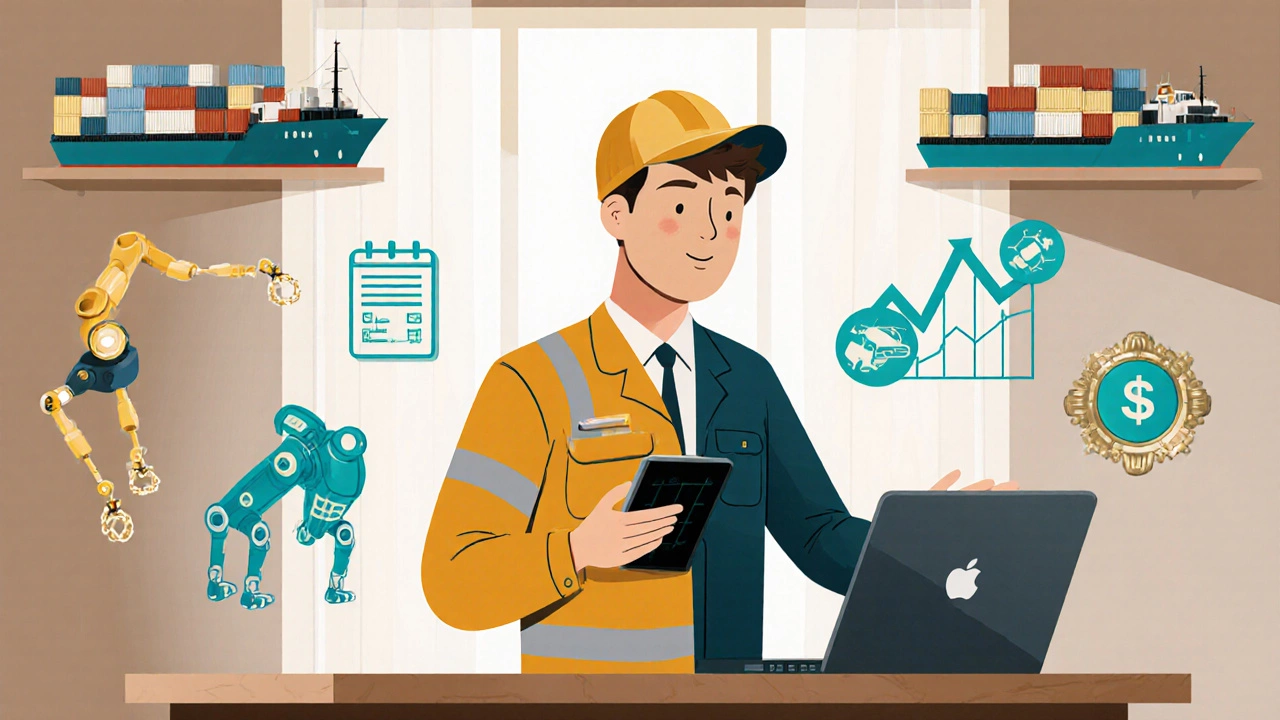Logistics Job Demand Estimator
Find Your Logistics Career
How This Works
Based on 2024 UK Logistics Industry Data:
• 147,000 open roles (41% growth since 2021)
• 32% e-commerce growth since 2022
• 80,000 worker shortage nationwide
Why choose logistics?
- Entry-level wages £12.50/hr
- Supervisor salaries £38,000-£52,000
- Top skills CILT certification, SAP, automation
Job Market Assessment
Estimated Openings
Based on 2025 industry projections
Salary Range
Including benefits and bonuses
Top recommendation: 12-week CILT certification courses available at local job centers
Every day, over 150 million packages move through global logistics networks. In the UK alone, e-commerce deliveries jumped by 32% between 2022 and 2024. And yet, warehouses are still short by nearly 80,000 workers. If you’ve ever wondered whether logistics is in high demand, the answer isn’t just yes-it’s urgent.
Logistics isn’t just moving boxes-it’s keeping the economy alive
Think of logistics as the invisible backbone of everything you buy online, eat, or use. It’s not just delivery drivers. It’s warehouse managers who schedule shifts for 300 people. It’s planners who reroute shipments when a port shuts down. It’s data analysts predicting demand spikes before Black Friday hits.
The pandemic didn’t create this demand-it exposed how fragile the system was. Since then, companies have doubled down. Amazon added 40 new fulfillment centers in Europe between 2023 and 2025. DHL invested $2.3 billion in automation and workforce training. Even small retailers now rely on third-party logistics providers because they can’t afford to build their own networks.
Job openings are growing faster than people can fill them
In 2024, the UK’s Office for National Statistics reported 147,000 open logistics roles-up 41% from 2021. The biggest gaps? Forklift operators, warehouse supervisors, and transport planners. In Liverpool alone, logistics firms posted 2,300 new positions in the last year. Many stayed open for over six months before filling.
Why the shortage? Two reasons. First, people are leaving the industry. A 2025 survey by the Logistics UK Trade Association found that 38% of warehouse staff quit within 18 months. Burnout, low pay, and irregular hours are the top reasons. Second, new tech is changing the game. Companies need people who can manage automated sorting systems, interpret real-time tracking data, and fix robotic arms-not just load pallets.
Wages are rising, but not fast enough
Logistics wages have gone up. Entry-level warehouse jobs now pay £12.50 an hour on average in the UK, up from £9.80 in 2021. Supervisors earn £38,000-£52,000. But inflation and housing costs have eaten into those gains. A warehouse worker in Manchester still spends 40% of their take-home pay on rent.
Meanwhile, companies are scrambling. Some are offering £2,000 signing bonuses. Others pay for driving licenses or cover childcare. One logistics firm in Birmingham started offering free mental health sessions-because stress-related absences were costing them £1.2 million a year.

Technology is creating new roles, not replacing them
You hear a lot about robots taking jobs. But in logistics, tech is creating more roles than it’s eliminating. Automated guided vehicles (AGVs) need technicians to maintain them. AI-driven route optimization tools need analysts to tweak them. Cloud-based warehouse systems need IT support staff who understand inventory workflows.
Here’s what’s actually happening: A warehouse that used to need 50 people to pick and pack now needs 30. But those 30 aren’t just packers-they’re system operators, data monitors, and maintenance crew. The job changed. The need didn’t disappear.
Global trade is still expanding
Even with inflation and geopolitical tensions, international trade volumes are rising. The World Trade Organization projects a 3.7% growth in global merchandise trade for 2025. That means more containers, more cross-border customs checks, more cold-chain logistics for medicines and food.
Companies like Maersk and FedEx are hiring in Eastern Europe and Southeast Asia to handle new trade routes. In the UK, ports like Felixstowe and Southampton are expanding. Each new berth needs customs agents, freight forwarders, and compliance officers. The demand isn’t local-it’s global.

Who’s hiring-and what skills do you need?
Logistics companies aren’t just hiring drivers anymore. Here’s who’s actively recruiting in 2025:
- Supply chain analysts-people who use Excel or Power BI to track delays and forecast stock levels
- Warehouse automation technicians-trained to repair and program robots, conveyor belts, and barcode scanners
- Freight forwarders-experts in customs rules, Incoterms, and international paperwork
- Logistics coordinators-the glue between drivers, warehouses, and customers
- Inventory managers-who use ERP systems like SAP or Oracle to prevent stockouts
Most of these roles don’t require a degree. Certifications from CILT (Chartered Institute of Logistics and Transport) or City & Guilds are more valuable. Many employers offer paid training. A 12-week course in warehouse operations can get you hired at a starting salary of £28,000.
The future of logistics jobs is hybrid
Logistics isn’t just about being on the floor anymore. Many roles now blend office and field work. A transport planner might spend mornings in front of a screen optimizing routes, then head out to check delivery hubs in the afternoon. A warehouse supervisor might use a tablet to scan inventory one hour and attend a safety meeting the next.
This shift makes logistics more attractive to younger workers. It’s not just physical labor-it’s problem-solving, tech use, and decision-making. Companies that offer flexible shifts, remote planning roles, and career paths are seeing retention jump by 50%.
Is logistics right for you?
If you’re looking for a job that’s stable, growing, and doesn’t require student debt-logistics is one of the few options left. You don’t need a degree. You don’t need to be tech-savvy from day one. You just need to show up, learn, and adapt.
Start with a short course. Apply for an apprenticeship. Talk to local logistics firms. Many have open days where you can walk through a warehouse and see the tech in action. The jobs are there. The pay is rising. The system still needs you.
The question isn’t whether logistics is in demand. It’s whether you’re ready to step into it.
Is logistics a good career choice in 2025?
Yes. Logistics is one of the fastest-growing sectors in the UK, with over 147,000 open jobs in 2024. Wages are rising, companies are investing in training, and there’s no sign of slowdown. It’s ideal for people who want stable work without a university degree.
Do I need a degree to work in logistics?
No. Most entry-level roles like warehouse operative, forklift driver, or transport coordinator don’t require a degree. Employers value certifications from CILT or City & Guilds, hands-on experience, and reliability. Many offer paid training programs that lead to promotions within 12-18 months.
What’s the biggest challenge in logistics right now?
The biggest challenge is the skills gap. Companies have automation and tech systems ready to go, but they can’t find enough people to run them. There’s also high turnover-nearly 40% of warehouse staff leave within a year. Employers are responding with better pay, mental health support, and flexible schedules.
Are logistics jobs being replaced by robots?
No-robots are creating new jobs. While machines handle repetitive tasks like moving pallets, humans are needed to monitor, maintain, and fix them. New roles like automation technician, data analyst for supply chains, and robotic systems operator are growing fast. The job is changing, not disappearing.
Where are the best logistics jobs in the UK?
Major logistics hubs include Manchester, Birmingham, East Midlands, and the ports of Felixstowe and Southampton. Liverpool has seen a 27% increase in logistics jobs since 2022 thanks to new warehouse developments and its proximity to European trade routes. Smaller towns near motorways also have growing opportunities.
How can I get started in logistics with no experience?
Start with a short course-many are free through local job centers or online platforms like FutureLearn. Apply for apprenticeships or entry-level warehouse roles. Highlight reliability, physical stamina, and willingness to learn. Many companies hire on the spot after a one-day trial shift. Don’t wait for the perfect resume-just show up and ask.


